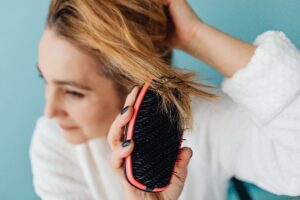Hair Health 101

When it comes to hair health, there’s an abundance of advice and information circulating, making it challenging to distinguish between myths and facts. Strong, vibrant hair is a universal desire, and understanding the truth about hair care is essential for achieving those luscious locks. In this blog post, we’ll unravel three common myths surrounding hair health and provide evidence-based facts to guide you on your journey to stronger strands.
Myth 1: Trimming Your Hair Frequently Boosts Growth
One of the most prevalent myths in hair care is the belief that frequent trims stimulate hair growth. Many individuals are led to believe that cutting their hair regularly, even if it’s healthy, will make it grow faster. However, the truth is quite the opposite.
Fact: Trimming Prevents Split Ends, Not Hair Growth
While trimming your hair won’t expedite growth from the roots, it does play a crucial role in maintaining overall hair health. Regular trims help prevent split ends, which can travel up the hair shaft and lead to breakage. By getting rid of split ends, you create a healthier environment for your hair to grow, minimizing the need for excessive trimming in the future.
To promote stronger strands, aim for a trim every 8-12 weeks, or as needed based on your hair’s condition. Focus on maintaining a healthy hair care routine, including nourishing treatments and protective styles, to foster optimal growth from the roots.
Myth 2: Washing Your Hair Every Day Strips It of Natural Oils
A common misconception is that washing your hair daily strips it of natural oils, leaving it dry and brittle. Many people opt for infrequent washing to preserve these oils and maintain hair health.
Fact: Hair Washing Frequency Depends on Hair Type
The ideal frequency for washing your hair depends on your hair type, lifestyle, and personal preferences. While it’s true that overwashing can strip the hair of natural oils, underwashing can lead to a buildup of oils, dirt, and product residue, which may compromise the health of your scalp and hair.
For those with oily hair, more frequent washing may be necessary, while individuals with dry hair may benefit from less frequent washing. Use a sulfate-free shampoo suitable for your hair type and follow up with a conditioner to maintain a healthy balance of moisture. Pay attention to how your hair and scalp respond, and adjust your washing routine accordingly.
Myth 3: Brushing Your Hair 100 Strokes a Day Promotes Shine and Growth
The notion that brushing your hair 100 strokes a day can enhance shine and stimulate growth is a vintage beauty myth that continues to persist. The idea behind this myth is that frequent brushing distributes natural oils evenly and promotes blood circulation to the scalp.
Fact: Excessive Brushing Can Cause Damage
While brushing your hair is essential for detangling and distributing natural oils, the 100-strokes-a-day rule is outdated and can lead to unnecessary damage. Excessive brushing, especially with the wrong type of brush, can cause breakage, split ends, and unnecessary stress on the hair shaft.
Instead of focusing on a specific number of strokes, prioritize the quality of your brushing routine. Use a wide-toothed comb or a brush with soft bristles to gently detangle your hair, starting from the tips and working your way up. Brushing should be a part of your routine to maintain hair health, but it’s crucial to do so with a gentle touch.

Separating hair care facts from myths is crucial for nurturing stronger strands and maintaining overall hair health. By understanding the truth about common misconceptions such as frequent trims for growth, the impact of washing frequency, and the 100-strokes-a-day rule, you can tailor your hair care routine to best suit your hair type and goals.
Focus on a balanced approach that includes regular trims, a washing routine based on your hair’s needs, and gentle brushing techniques. Embrace the uniqueness of your hair, listen to its signals, and adopt a personalized hair care routine that promotes strength, shine, and vitality. With these evidence-based facts, you can confidently embark on a journey to healthier and more resilient locks.

